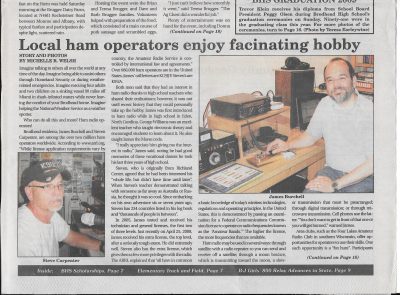Imagine talking to others all over the world at any time of the day. Imagine being able to assist others through Homeland Security or during weather-related emergencies. Imagine rescuing four adults and two children on a sinking vessel 90 miles off Miami in shark-infested waters while never leaving the comfort of your Brodhead home. Imagine helping the National Weather Service as a weather spotter.
Who can do all this and more? Ham radio operators!
Brodhead residents, James Burchell and Steven Carpenter, are among the over two million ham operators worldwide. According to www.arrl.org, “While license application requirements vary by country, the Amateur Radio Service is controlled by international law and agreements.” Over 660,000 ham operators are in the United States. James’ call letters are KC9JJF. Steven’s are K9UA.
Both men said that they had an interest in ham radio thanks to high school teachers who shared their enthusiasm; however, it was not until recent history that they could personally take up the hobby. James was first introduced to ham radio while in high school in Eden, North Carolina. George Williams was an excellent teacher who taught electronic theory and encouraged students to learn about it. He also taught James the Morse code.
“I really appreciate him giving me the interest in radio,” James said, noting he had good memories of these vocational classes he took his last three years of high school.
Steven, who is originally from Richland Center, agreed that he had been interested his “whole life, but didn’t have time until later”. When Steven’s teacher demonstrated talking with someone as far away as Australia or Russia, he thought it was so cool. Since embarking on his own adventure six or seven years ago, Steven has 234 countries listed in his log book and “thousands of people in between”.
In 2005, James tested and received his technician and general licenses, the first two of three levels. Just recently on April 25, 2009, James received his extra license, the top level, after a seriously tough exam. He did extremely well. Steven also has the extra license, which gives them a few more privileges with the radio. The ARRL explained that “all have in common a basic knowledge of today’s wireless technologies, regulations and operating principles. In the United States, this is demonstrated by passing an examination for a Federal Communications Commission license to operate on radio frequencies known as the ‘Amateur Bands.’” The higher the license, the more frequencies that are available.
Ham radio may be used in several ways: through satellite with a radio repeater so you can send and receive off a satellite; through a moon bounce, which is transmitting toward the moon, a slower transmission that must be prearranged; through digital transmission; or through microwave transmission. Cell phones use the latter. “You don’t want to get in front of that one or you will get burned,” warned James.
Area clubs, such as the Four Lakes Amateur Radio Club in southern Wisconsin, offer opportunities for operators to use their skills. One such opportunity is a “fox hunt”. Participants armed with a mobile receiver use their skills to find the “fox”. Interference can be determined by doing this. Identifying the cause of interference means the interference may be minimized or eliminated. Many such activities are on James’ future agenda.
James has a 50-watt radio in his car. It is like a scanner. He can transmit and receive messages with other licensed radio operators. He enjoys having this capability because he can get in a little hobby time during his work commute.
Ham radio can fit varying budgets. You can start out with a couple hundred dollars or spend much more. Since starting, James has added a tuner, which helps his radio transceiver and antenna work together better. “You can hear better and talk farther,” James said.
Radio science has led to the wireless technology enjoyed by many computer users today. During the World Wars, recruited ham operators used their knowledge of the Morse code. Morse code can get through horrible atmospheric conditions. Special Forces in the military use the Morse code because it is reliable. This requirement was discontinued for ham operators in February 2007.
Ham radio is not just a hobby though; it is a service. Ham radio has been helpful to emergency personnel during catastrophic events such as Katrina and 9-11. Ham operators were able to notify rescue personnel and the media of where the needs were greatest before others could get into the area. Information can travel around the world and not be impeded by language barriers or the breakdown of landlines. They may also communicate easily to those on ships and in space. Storm spotters are often ham operators.
Steven is involved in the weather aspect of the hobby. He is the Green County Storm Chaser net control operator, who reports to Sullivan and others about storm conditions in Green County. He watches the severe weather on radar now, but he used to be out in the field in the midst of the weather. Others report from the field to him now. Steven wishes more young people would become interested in ham radio. To be a storm chaser, for example, one just needs the entry license.
Steven also has a regular shift communicating with the Coast Guard and ships. He helps monitor distress signals. He has helped rescue ships at sea using his ham radio in Brodhead.
“I like being able to save lives,” Steven said. He has helped a foreign doctor get through to the Mayo Clinic, rescued people at sea, known about earthquakes almost immediately before the news media has broadcasted anything, and helped military deployed personnel or missionaries be patched through onto the telephone to loved ones.
A person may commit as much time as he wants to the hobby. Because James has young children, he thinks five hours per week is a big week. “I don’t want it to overburden things that are more important,” he said.
Steven spends many, many hours, sometimes five or more hours per day, more if a ship is in trouble.
When satellites, computers, landlines and other forms of communication fail, ham radio can still get through. It’s an exciting hobby that allows you to make friendships with folks you may never meet and to be a part of a special community that helps others. It is also something that will give you satisfaction at the end of the day, knowing that you helped someone in some way.
Post Script: While researching this article, I, Michelle, was able to speak with men from Mexico City, Puerto Rico and Jamaica within a span of a few minutes. I learned of a recent earthquake in Mexico that was 5.7 on the Richter scale. It is an interesting hobby with cool capabilities. If you are searching for a hobby, this is one to check out.
Story and Photos by Michelle R. Welsh
Originally published in the Brodhead Free Press, June 5, 2009.
Discover more from Michelle Kaderly Welsh
Subscribe to get the latest posts sent to your email.




No responses yet